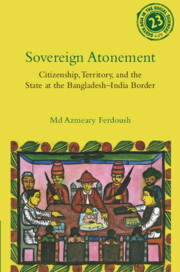Book contents
- Frontmatter
- Contents
- List of figures
- Preface
- Acknowledgments
- Introduction: Remnants, nations, and the sovereign
- 1 Sovereign atonement
- 2 From “sensitive” to “symbolic” spaces
- 3 Land and citizenship as technologies of territory
- 4 Everyday governance: Ambiguity, accountability, and abundance
- 5 Infrastructure, belonging, and the state
- 6 Refusal and tolerance
- Epilogue
- Appendix: A note on methods
- References
- Index
1 - Sovereign atonement
Published online by Cambridge University Press: 30 April 2024
- Frontmatter
- Contents
- List of figures
- Preface
- Acknowledgments
- Introduction: Remnants, nations, and the sovereign
- 1 Sovereign atonement
- 2 From “sensitive” to “symbolic” spaces
- 3 Land and citizenship as technologies of territory
- 4 Everyday governance: Ambiguity, accountability, and abundance
- 5 Infrastructure, belonging, and the state
- 6 Refusal and tolerance
- Epilogue
- Appendix: A note on methods
- References
- Index
Summary
The “problem” for the Bangladeshi state regarding the newly gained enclave residents and territories was twofold: First, there was the problem of legibility – that is, creating a condition that would enable the state to intervene to an extent so the former enclaves became easily “readable” to it by employing numerous “standardization” mechanisms (Scott, 1998). Second, there was the problem of “governmentality” (Foucault, 2007) – that is, an institutional ensemble that would permit the exercise of governmental power with compartmentalized governing apparatuses to manage the enclave residents and territories. Since the enclaves were not under the formal jurisdiction of the state of Bangladesh until they were exchanged, they were neither legible nor governable. However, as they were handed back to the host state, creating legible state spaces and governing the population gained paramount importance (Ferdoush, 2021a). Yet what makes this highly suggestive and equally interesting is how they were brought under the schemes of legibility and governmentality because of the enclaves’ unique history and status. A range of actors, including journalists, academics, state elites, and politicians, have always justified this uniqueness as exceptional. The exceptional rhetoric gained traction because it fit the zone of indistinction between the inside–outside, as Giorgio Agamben (1998) identifies, and because it allowed an ease of explanation for state territories that did not fit the postcolonial territorial norm – that is, to be located within the nation's geo-body (Winichakul, 1994). The exception therefore holds the key to our reading of the former enclaves, even after they were exchanged and made part of regular state spaces. It concurrently unpacks the mechanisms and the rationale behind selectively privileging one group of the population over others. The very nature of the exception thus provides an answer to a crucial question: why and how does the sovereign bring the same population it once excluded under its protection and onto which it projected violence?
The “exceptional turn” in political geography, with Agamben's retake on Carl Schmitt's idea of the sovereign being the one “who decides on the state of exception” (Agamben, 1998, p. 11), complicated by bio-power, bare lives, and in/exclusion within or from the law, has produced an impressive body of scholarship (Hopkins, 2019; Mountz, 2013).
- Type
- Chapter
- Information
- Sovereign AtonementCitizenship, Territory, and the State at the Bangladesh-India Border, pp. 27 - 47Publisher: Cambridge University PressPrint publication year: 2024



